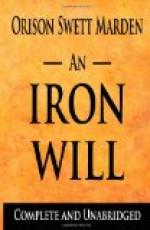“The wills, the won’ts, and the can’ts.”
“There are three kinds of people in the world,” says a recent writer, “the wills, the won’ts, and the can’ts. The first accomplish everything; the second oppose everything; the third fail in everything.”
The shores of fortune, as Foster says, are covered with the stranded wrecks of men of brilliant ability, but who have wanted courage, faith, and decision, and have therefore perished in sight of more resolute but less capable adventurers, who succeeded in making port.
Were I called upon to express in a word the secret of so many failures among those who started out with high hopes, I should say they lacked will-power. They could not half will: and what is a man without a will? He is like an engine without steam. Genius unexecuted is no more genius than a bushel of acorns is a forest of oaks.
Will has been called the spinal column of personality. “The will in its relation to life,” says an English writer, “may be compared at once to the rudder and to the steam engine of a vessel, on the confined and related action of which it depends entirely for the direction of its course and the vigor of its movement.”
Strength of will is the test of a young man’s possibilities. Can he will strong enough, and hold whatever he undertakes with an iron grip? It is the iron grip that takes and holds. What chance is there in this crowding, pushing, selfish, greedy world, where everything is pusher or pushed, for a young man with no will, no grip on life? The man who would forge to the front in this competitive age must be a man of prompt and determined decision.
A TAILOR’S NEEDLE.
It is in one of Ben Jonson’s old plays: “When I once take the humor of a thing, I am like your tailor’s needle—I go through with it.”
This is not different from Richelieu, who said: “When I have once taken a resolution, I go straight to my aim; I overthrow all, I cut down all.”
And in business affairs the counsel of Rothschild is to the same effect: “Do without fail that which you determine to do.”
Gladstone’s children were taught to accomplish to the end whatever they might begin, no matter how insignificant the undertaking might be.
WHAT IS WORSE THAN RASHNESS
It is irresolution that is worse than rashness. “He that shoots,” says Feltham, “may sometimes hit the mark; but he that shoots not at all can never hit it. Irresolution is like an ague; it shakes not this nor that limb, but all the body is at once in a fit.”
The man who is forever twisting and turning, backing and filling, hesitating and dawdling, shuffling and parleying, weighing and balancing, splitting hairs over non-essentials, listening to every new motive which presents itself, will never accomplish anything. But the positive man, the decided man, is a power in the world, and stands for something; you can measure him, and estimate the work that his energy will accomplish.




